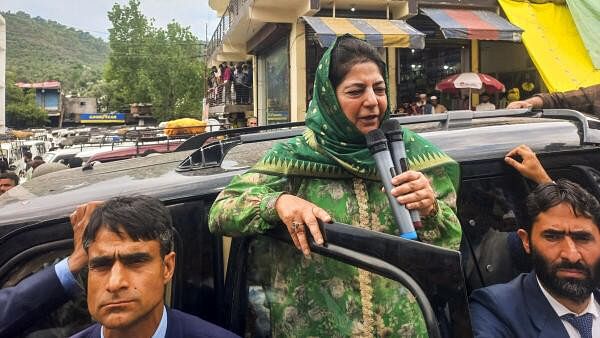
PDP chief Mehbooba Mufti
Credit: PTI Photo
Srinagar: The war of words between former Jammu and Kashmir Chief Ministers Omar Abdullah of the National Conference (NC) and Mehbooba Mufti of the Peoples Democratic Party (PDP) is heating up as the assembly polls approach in the Union Territory (UT).
Once allies under the People's Alliance for Gupkar Declaration (PAGD), the two parties now engage in fierce exchanges, each blaming the other for the current crisis in J&K. The rhetoric has sharpened during the ongoing election campaign, with Omar and Mehbooba trading barbs.
In an attempt to assert NC’s dominance, Omar recently urged Mehbooba’s PDP to withdraw their candidates and concede the election field to the NC. He also indirectly criticized Mehbooba for her remarks about the Abdullahs being a political dynasty.
“Those who accused us of dynastic politics have now fielded their own relatives (Mehbooba’s daughter Iltija). If they were truly against dynastic politics, they should have chosen candidates other than their own family members,” he said.
Omar also took a swipe at the banned Jamaat-e-Islami for entering the electoral fray, contrasting their previous stance against elections with their current participation.
In response, Mehbooba Mufti reminded Omar that the NC has a long history of altering their stance on elections, labeling them as “haram” or “halal” depending on their political convenience.
“From 1947 to today, the NC has been inconsistent in its stance on elections,” Mehbooba said. “In 1947, when Sheikh Abdullah first became Chief Administrative Officer of J&K and later aligned with India, elections were considered halal. When he became Prime Minister, they were still halal. But when he was removed, elections became haram for 22 years.”
She highlighted that during those years (1953-1975), the NC consistently opposed elections, advocating for a plebiscite instead. “When Sheikh Abdullah returned to power in 1975, suddenly elections were halal again. This shifting narrative on elections has long impacted the political process in J&K, and it’s disappointing to see it persist.”
The escalating exchange between Abdullah and Mufti underscores the high stakes of the upcoming elections, with both parties vying to position themselves as the true defenders of Jammu and Kashmir’s future.